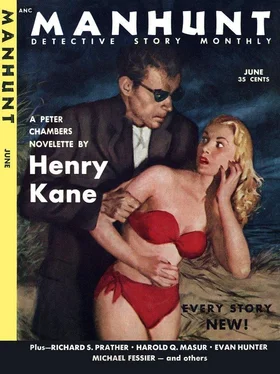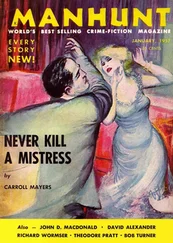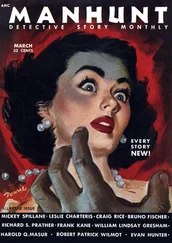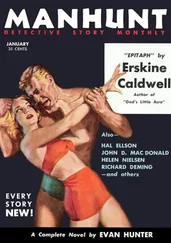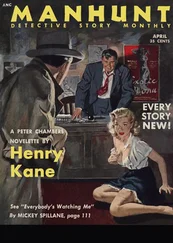Ричард Деминг - Manhunt. Volume 1, Number 6, June, 1953
Здесь есть возможность читать онлайн «Ричард Деминг - Manhunt. Volume 1, Number 6, June, 1953» весь текст электронной книги совершенно бесплатно (целиком полную версию без сокращений). В некоторых случаях можно слушать аудио, скачать через торрент в формате fb2 и присутствует краткое содержание. Город: New York, Год выпуска: 1953, Издательство: Flying Eagle Publications, Жанр: Детектив, на английском языке. Описание произведения, (предисловие) а так же отзывы посетителей доступны на портале библиотеки ЛибКат.
- Название:Manhunt. Volume 1, Number 6, June, 1953
- Автор:
- Издательство:Flying Eagle Publications
- Жанр:
- Год:1953
- Город:New York
- ISBN:нет данных
- Рейтинг книги:5 / 5. Голосов: 1
-
Избранное:Добавить в избранное
- Отзывы:
-
Ваша оценка:
- 100
- 1
- 2
- 3
- 4
- 5
Manhunt. Volume 1, Number 6, June, 1953: краткое содержание, описание и аннотация
Предлагаем к чтению аннотацию, описание, краткое содержание или предисловие (зависит от того, что написал сам автор книги «Manhunt. Volume 1, Number 6, June, 1953»). Если вы не нашли необходимую информацию о книге — напишите в комментариях, мы постараемся отыскать её.
Manhunt. Volume 1, Number 6, June, 1953 — читать онлайн бесплатно полную книгу (весь текст) целиком
Ниже представлен текст книги, разбитый по страницам. Система сохранения места последней прочитанной страницы, позволяет с удобством читать онлайн бесплатно книгу «Manhunt. Volume 1, Number 6, June, 1953», без необходимости каждый раз заново искать на чём Вы остановились. Поставьте закладку, и сможете в любой момент перейти на страницу, на которой закончили чтение.
Интервал:
Закладка:
Suppose he had not circled at the precisely lucky arc which led him back to his own trail only a mile from the cabin, she wondered? Suppose nightfall had caught him wandering in the vast expanse of snow? Her reasoning told her it would be inconceivable for him to have the same blind luck twice.
Terror-stricken by the direction her thoughts were taking, she found herself deliberately weighing her husband’s life against Johnny’s. If Johnny did manage to get through, Harry still probably would survive. But if Johnny failed, both men would die.
She came to a decision.
“You’d be wasting your time, Johnny,” she said in a thin voice. “He’s so toxic now, even a hospital couldn’t save him.”
Johnny stared at her. After a long time he said, “Maybe you could be wrong. Even doctors make mistakes.”
“Not about septicemia,” Cynthia said soberly. “I’ve been a registered nurse for five years, Johnny. I know when blood poisoning has reached the point where it’s hopeless.”
Wordlessly he continued to stare at her for another full minute. Finally his face blanked of all expression.
Walking over to the table, he said, “How about food?”
In a trancelike state of mental exhaustion she heated him a can of stew and made him a pot of coffee. While he ate, Cynthia made Harry as comfortable as she could.
When Johnny finally pushed back from the table, he dragged the galvanized washtub from its corner, lifted the snow shovel and went out the front door. Within minutes he was back with a half tubfull of snow. Cynthia watched wide-eyed.
Then he looked at her, and the hunger in his eyes was flaunted. She backed from the look.
“I’m... I’m not going to take a bath tonight, Johnny.”
Johnny raised his eyebrows. Then he glanced at Harry, but the old expression of respect and understanding was gone from his dyes. The glance was a dismissal, the callous appraisal of a corpse.
“How long will he drag it out?”
Cynthia licked her lips. “A few days. A week. Maybe longer.”
“I’m not waiting a week,” Johnny said. He walked toward her slowly and she backed until she was pressed against the upright at the foot of her bunk. His eyes moved over her tight turtlenecked sweater, down along her woolen slacks to her ski boots and up along her body again.
“Take your clothes off,” he said.
The words aroused Harry. “What was that?” he asked.
Ignoring him, Johnny continued to stare at Cynthia. She whispered, “Not in front of him, Johnny. Good God! Not right in front of him!”
“Take your clothes off!”
“Why, you Son...!” Harry said weakly. “No-good, lousy Son...!”
When Cynthia merely continued to stare at Johnny from overlarge eyes, he suddenly landed his palm across her cheek with such force she was knocked sprawling on her bunk.
“This is the last time. Take them off or I’ll rip them off.”
She stared up at him in unbelieving fascination. But as his hands tensed to reach for her, she sat up with a shudder, leaned forward without taking her enormous eyes from his face, and with unsteady fingers slowly began to unlace her boots.
From the other bunk the shriek of profanity lifted to a crescendo.
The Faceless Man
by Michael Fessier
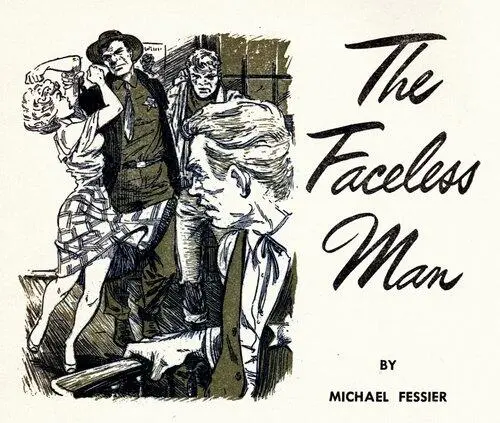
At one time if anyone had suggested that the residents of Green Valley could conceivably form themselves into a mob, lusting for the blood of a fellowman, I would have called him insane. Now I know better. Green Valley isn’t in the Deep South; it’s in a midwestern farming state, which proves that lynching isn’t a fault of geography but of humanity. And humanity happens to be a family we all belong to no matter where we live. To those of you who have read about lynchings committed in places far from your homes and who have wondered what sort of a person a lyncher is, I have this to say: A lyncher is neither tall nor short, nor young nor old, nor male nor female, and he is faceless, but, under certain given circumstances and under certain given conditions, he is you and you and you and, yes, he is even me.
The chain of events which led the citizens of Green Valley a long way back down the path of evolution toward their original animal state began during the hot, dry summer when their crops were withering and they were worrying about their mortgages and other debts. Henry Rankins gave them something to talk about other than their troubles by taking Claude Warren, an ex-convict, into his home to live with him and help him run his farm. Claude was hardly more than a kid and his crime had not been committed against us nor among us, but he had served eight months in State’s Prison and that was enough to set public opinion against him right from the start.
Perhaps the feeling against Claude might have been passive rather than active if it had not been for Orry Quinn. Orry was the third of Pete Quinn’s shiftless sons and he had been employed as a farm hand by Henry Rankins until a week before Claude came along. Henry had fired Orry for general reasons of incompetence and, specifically, for having wandered off one evening to see his girl, leaving the cows in the shed restless and in pain from not having been milked. Any other farmer would have done the same thing under the circumstances and nobody would have been perturbed about Orry’s being unemployed, a condition which had grown to be more or less chronic with him anyway, had not Orry seized the opportunity to become a self-constituted martyr to social injustice. He claimed he had performed his labors faithfully and well, only to be removed on a trumped-up charge to make room for a felon, an ex-convict and, for all anybody knew, a potential murderer. This story was accepted at face value by most of the younger and more discontented non-working citizens of the community, and even men of substance and intelligence, who normally wouldn’t have accepted Orry’s sworn oath as to the date of his birth, began to place credence in it. Green Valley was composed of a close-knit group of families and they believed in taking care of their own. Whether or not they sympathized with Orry, they found it hard to understand why Henry Rankins would have passed up an opportunity to give a native son much needed employment in favor of an outsider who happened, in addition, to be a criminal.
Finally a small delegation called at Henry’s farm to seek the answer. They found Henry in a shed cleaning eggs and placing them in cartons. Helping him was Claude Warren. Claude was a husky, clean-cut, towheaded kid not much different than dozens of others in Green Valley, excepting that his skin was pale and there was a half-apologetic look in his eyes.
Henry, a small old man with wrinkled, leathery skin, seemed to know why the delegation was there.
“Would you mind taking a walk, son?” he said to Claude. “I think my good friends and neighbors want to have a talk with me.”
Claude nodded, then hurried away, his head hanging as if he, too, knew the reason for the visit. Then Henry faced his friends and neighbors.
“Hello boys!” he said blandly. “How’re things? How’s crops? Been working hard? Been borrowing money from the bank? How much? Got any insurance in case you kick off and leave your families without support?” As he talked, his eyes seemed to be boring into those of each individual member of the group. “How’re you getting along with your wives?” he went on. “Any truth to the rumor that one of you slapped his old lady in front of the kids? And how about your daughters? Do you know where they are of nights and what they do?”
He paused and waited as the others shifted their feet uneasily in the dust, avoided his gaze and remained collectively silent.
Читать дальшеИнтервал:
Закладка:
Похожие книги на «Manhunt. Volume 1, Number 6, June, 1953»
Представляем Вашему вниманию похожие книги на «Manhunt. Volume 1, Number 6, June, 1953» списком для выбора. Мы отобрали схожую по названию и смыслу литературу в надежде предоставить читателям больше вариантов отыскать новые, интересные, ещё непрочитанные произведения.
Обсуждение, отзывы о книге «Manhunt. Volume 1, Number 6, June, 1953» и просто собственные мнения читателей. Оставьте ваши комментарии, напишите, что Вы думаете о произведении, его смысле или главных героях. Укажите что конкретно понравилось, а что нет, и почему Вы так считаете.
